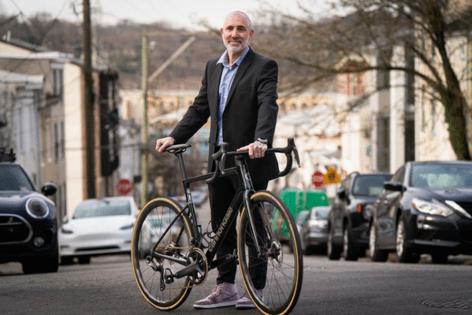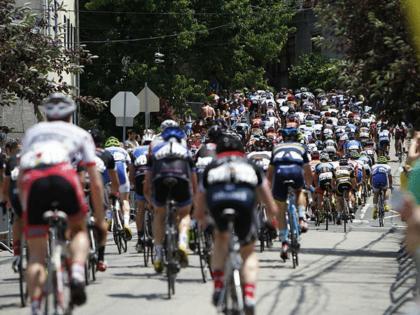The Philadelphia International Cycling Classic made Philly history. One man is on a mission to bring it back
Published in Lifestyles
PHILADELPHIA -- Back when Carlos Rogers was a kid growing up in Philly, the world renowned bike race that came to be known as Philadelphia International Cycling Classic was the stuff of dreams. And the Manayunk Wall — a grueling uphill climb that was an iconic feature of the course — was right in his own neighborhood.
Flash forward to 1994 when Rogers was 25. He got the professional credentials to be in the race, and at one point, cycling into Manayunk, Lance Armstrong was pedaling right alongside him.
“I said, ‘Hey, man, I’m from Philly!’ He’s like, ‘Oh yeah, hometown favorite!’ It was pretty cool. And I remember climbing The Wall and seeing all my neighbors.’”
Since its start in 1985, the epic race in all its various incarnations bearing the names of its various corporate sponsors drew professional cyclists from all over the world. Olympic gold medal-winning speed skater Eric Heiden was its first winner. Each year, tens of thousands of spectators packed the sidelines of the 14-mile route, waving and cheering, cowbells in hand, bursting with Philly pride.
“It was a thrill,” said Rogers.
But 2016 was the final year. Between rising costs and lack of sponsorship, the 2017 race was canceled. There was never another.
But Rogers, 54, never forgot. Nor did a lot of people.
For the past year, Rogers, now a Center City businessman, has been on a mission — a passion project he believes would benefit cycling and his city:
Bringing back the Philadelphia International Cycling Classic.
“This is not like Field of Dreams — ‘If you build it they will come,’” said Rogers, who owns Hush Salon in Old City with his wife Adrienne. “It’s already been built, and we know they’re going to come. It’s proven to be successful.”
A $2 million race
Rogers’ has been a grassroots effort, and a tireless one at that. He has reached out to businesspeople large and small, community leaders, elected officials, regular folks. He’s found support for his project, but so far hasn’t secured a financial backer like the big banks or Parx Casino that had sponsored the race before.
His hope is to find a title sponsor that would contribute $750,000 to $1 million to relaunch the race and attract other sponsors. Ultimately, he figures it would cost about $2 million to run the Classic today. Much of that, he said, would be paying for the city services, but it would also include prize money and accommodations for international cyclists.
Rogers’ goal is to bring the race back by sometime in 2025 — and keep it going.
“I’m not trying to do this one time,” he said. “But I need someone to sign a check.”
Besides being a passionate cyclist who had raced professionally for 15 years and managed a regional cycling team, Rogers isn’t a neophyte when it comes to promoting cycling events.
The Philly native organized the Historic Riverton Criterium, a competitive cycling event going on its 13th year in his adopted town of Riverton, N.J.
Cycling seems to run in the family. Older brother Lee Rogers has owned Bicycle Therapy, his Center City bicycle shop, for the last 33 years.
What is needed for the race to return?
In its heyday, the Philly event took cyclists on a 156-mile repeating, picturesque loop down the Benjamin Franklin Parkway and Kelly Drive, through the northwest neighborhoods of East Falls, Manayunk, and Roxborough, back to the Parkway and Logan Circle, and whizzing by Fairmount Park’s Lemon Hill and Boathouse Row.
Rogers said what really inspired him was watching the inaugural Maryland Cycling Classic in 2022, a race that also draws international talent.
“It just made me miss seeing the race here in Philadelphia,” Rogers said.
The more people Rogers talks to, the more he finds folks who agree with him.
State Rep. Tarik Khan, (D-194), whose district includes Manayunk, said he wants to speak with city officials and other stakeholders to gauge their interest in the project.
“There’s a lot of upside, and I think there’s a lot of support from the community. Pretty much to a person that I’ve talked to, people are for the bike race,” Khan said. “I think they want to make sure that it’s done right, and it’s organized.”
Gwen McCauley, executive director of the nonprofit Manayunk Development Corporation, said her organization plans to look at how it might be able to support Rogers’ efforts.
“We would love to see this iconic international event back in Philadelphia,” she said. “That was an exciting period, and it fell by the wayside due to sponsorship and rising costs to run the race.”
Robin Morton, co-founder of g4 Productions, an event planning firm, was technical director of the race for several of its years and event director at its end. She is one of the people Rogers has turned to for advice, and he hopes to have her be race director if he can bring it back.
“It became challenging to find replacement sponsors, but that’s true with so many different sports,” Morton said. “It’s a big nut to crack.”
If a good sponsor can be found, she believes the event can be a success.
“I think it was a great event for the city. It was high visibility; teams came from around the world. So everybody knew about the bike race in Philadelphia. But I think it has to work for the city financially,” Morton said.
$17 million worth of economic activity
Econsult Solutions, a Philadelphia economic consultant, did a pro bono financial impact study on reviving the race. Firm president Peter Angelides said their findings indicate positive returns for the city and the region.
“The bike race supports nearly $14 million of economic activity in the City of Philadelphia, with an additional $3 million elsewhere in the Commonwealth, for a total of $17 million in Pennsylvania,” Angelides said.
Those estimates include spending by organizers, visitors, spectators, and participants as they prepare for the race, travel into the city, and spend while they are here, he said.
“The race also generates goodwill and additional tourist interest in Philadelphia,” he said, positive impacts not included in the study’s numbers.
Rogers hasn’t yet tried to meet with city officials; he figures Mayor Cherelle Parker has had enough on her plate settling into office. But he hopes to.
Bringing back the Classic is his dream, but he believes it can be the city’s as well.
“It was such a great event for the city, such a unique event,” Rogers said. “It’s one of the great outdoor arenas in the country to see the top riders in the world — the pageantry and the parade of riders and the excitement as they come.
“If you ask anyone who remembers the race, they’ll say, ‘Every year I used to go to Lemon Hill,’ or ‘I lived in Manayunk on The Wall, it was so awesome.’” he said. “People had parties, and it was a gathering. It was more than just a bike race.”
©2024 The Philadelphia Inquirer, LLC. Visit at inquirer.com. Distributed by Tribune Content Agency, LLC.










Comments